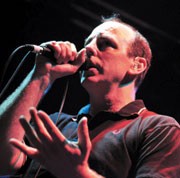Greg Graffin has found a way to pursue his dual passions for evolutionary biology and music.

Greg Graffin has two passions: evolutionary biology and music. The latter led him to co-found renowned punk band Bad Religion in 1980. But even as a child he was wooed by the provocative lyrics of Charles Darwin's theory on evolution. Now an occasional biology lecturer at the University of California, Los Angeles, Graffin last month released the book Anarchy Evolution: Faith, Science, and Bad Religion in a World without God, co-authored with science writer Steve Olson. He calls the work part memoir and part polemic. Graffin tells Nature how he turned to music without ever abandoning science.
When did you decide to pursue a PhD in evolutionary biology?
On entering college. I had already released an album, in 1982. I was only 17 or 18, and the band was my outlet, but it didn't yet have an international reputation. When I was a teenager, science meshed with my developing ideals — such as the challenge to authority that was central to punk rock. In science, anyone from any walk of life could make a discovery that would overturn prevailing hypotheses. And that was a cause for celebration among scientists. It taught me that challenging authority has good results.
How did you get a PhD while the lead singer for an internationally known rock band?
I got interested in palaeontology and vertebrate history — sparked by books on human evolution — then vertebrate evolution. Studying with palaeontologists kindled my interest in fieldwork.
I struggled to keep one foot in music and one in academia. I had worked on my PhD for three years full time before I realized Bad Religion could be a legitimate career. We had tour offers from 12 countries.
How did science influence your music?
One example might be our song I Want Something More. The lyrics discuss how we as humans struggle to form our world view. That is why religion was such an easy target — not to tear it down, but to identify its fatal flaws. It claims to offer a world view, but not one that resonates with us.
Did touring hinder your PhD?
I took six years' leave from graduate school, but it wasn't just because of the band. I had children, a divorce. All the while, I considered Bad Religion a fruitful intellectual pursuit. By the time I went back to graduate school, my focus had shifted from vertebrate palaeontology to the intersection of science and religion.
Was the band supportive of your science?
The band has been together for 30 years. Everyone has always known that touring follows the academic schedule. We tour in summer when there is no fieldwork. Since high school, we've recognized that what makes us unique is the stories under the music, and my science is among them.
Do scientists often not take you seriously?
Yes. I'm more likely to be criticized for my science, because I've been successful in music. I appreciate criticism, but so much of it isn't constructive. Steve Olson has given me insight into what to expect with the book. Academic scientists aren't generally interested in books for the public. So when one comes out, the authors can't expect much praise from scientists. My goal both as a singer and an instructor is to educate through provocation and entertainment.
How do your students react to your fame?
My classes have up to 350 students. The usual attitude is, “We're serious. We're pre-meds. Just tell us what we need to get an A.” With pre-meds, you will weed out a lot of the punk rockers. But I have lively conversations in office hours.
Did you really, as noted in the book, forgo an outing with a groupie to do fieldwork in Brazil?
By the time that happened, I had already had the experiences that a rock star needs to experience. I started Bad Religion at 15. And those activities stimulate different parts of my brain.
Additional information
Interview by Gene Russo
Related links
Related links
Related links in Nature Research
Balancing belief and bioscience
Graduate Journal: The science of religion
Something rotten in the state of palaeontology
Related external links
Rights and permissions
About this article
Cite this article
Russo, G. Turning point: Greg Graffin. Nature 467, 1143 (2010). https://doi.org/10.1038/nj7319-1143a
Published:
Issue Date:
DOI: https://doi.org/10.1038/nj7319-1143a
